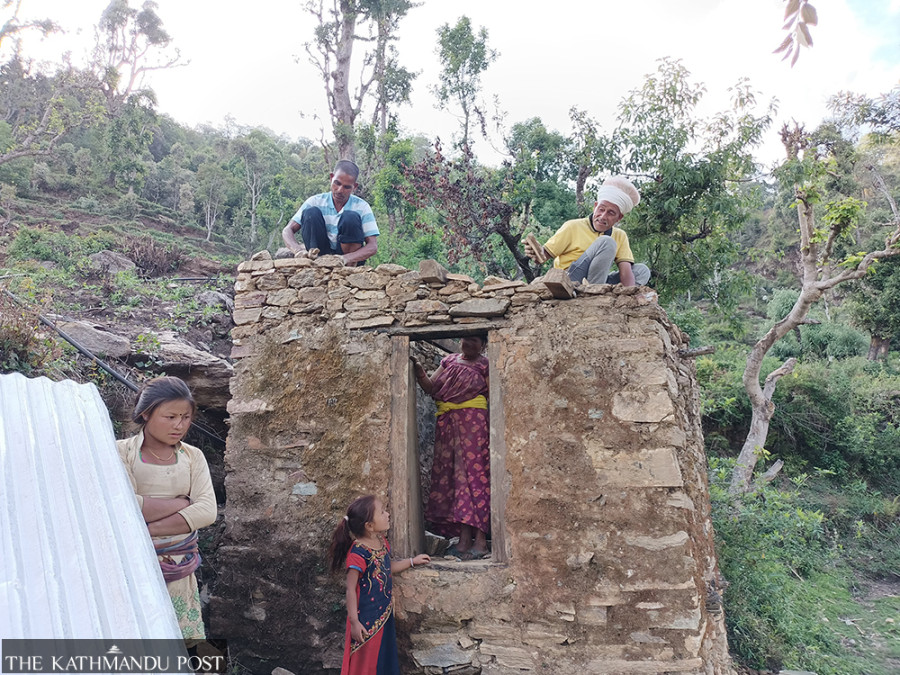Sudurpaschim Province
Anti-Chhaupadi campaign in Achham losing steam
Neither the police administration nor the local units and local people are showing interest in effectively implementing the campaign, women say.
Menuka Dhungana
Parbati Budha Rawat, aged 20, of Sanfebagar Municipality-3 in Achham died of suffocation in a Chhaupadi shed two years ago. Following media reports of the incident and uproar in the public sphere, the Ministry of Home Affairs had immediately written to 19 districts of Sudurpaschim and Karnali provinces instructing them to put an end to the evil practice.
The District Administration Office in each district was asked to demolish Chhaupadi sheds, raise awareness among people about the evils of such practices and take legal action against those who do not comply with the directives.
Based on the instruction, police had arrested Parbati’s brother-in-law on the charge of forcing her to observe Chhaupadi.
As per the home ministry’s instruction, the District Police Office in Achham launched a drive to demolish Chhaupadi sheds in all 91 wards of 10 local units in the district. Security personnel, with the help of the people’s representatives and the locals, demolished more than 10,000 Chhaupadi sheds in the district.
Chhaupadi, the practice of banishing women to secluded huts during their menstrual cycles and postpartum periods, is mainly prevalent in the rural areas of Sudurpaschim and Karnali provinces.
In the next two years of the ministry’s directives, the ward members, ward chairpersons and mayors/chiefs led the anti-Chhaupadi drive in settlements, wards and local units respectively. But of late, the campaign has run out of steam, say the women of Achham.
Neither the police administration nor the local bodies and the local people are showing interest in effectively implementing the campaign.
“It appears that the authorities launched the campaign just for the sake of it. At first, the campaign roped in many supporters but later the authorities did not follow up or monitor how the campaign was being implemented,” said Puja Shah of Bannigadhi Jayagadh Rural Municipality-6. “The anti-Chhaupadi campaign was backed by the government in the aftermath of Parbati’s death. We were hopeful about its success. But now Chhaupadi sheds are being rebuilt in the villages.”
Shah underscores the need for the authorities to continue the anti-Chhaupadi drive with frequent monitoring and to take legal action against those who force others or participate in the social evil.
“The campaign was effective when it took off. Women and girls had stopped going to Chhau sheds during menstruation and no one forced them to either. But now the women are back in the sheds,” said Shah.
According to Shah, the women and girls only stay in their houses during their menstruation when there are monitoring teams in the villages. “But on days when there is no one to report them, the women and girls stay in the Chhau sheds,” she said.
It’s not only the women and girls from rural areas who have gone back to observing Chhaupadi. Those in Mangalsen, the district headquarters known to be an urban centre, have also started returning to Chhau sheds during their menstruation.
“The local women in Mangalsen Municipality have started going to Chhaupadi sheds now. Some of us have been working tirelessly to eradicate Chhaupadi but the people’s representatives and police have started looking the other way. We can’t continue the campaign alone,” said Srijana Saud, a resident of Mangalsen-3 who is a vocal proponent of the anti-Chhaupadi campaign.
In a bid to make the anti-Chhaupadi drive effective last year, the District Administration Office (DAO) in Achham had instructed all 91 ward offices not to provide government services to any member of a family that practised Chhaupadi. But the directive was never implemented.
Going against its own decision, the DAO still issues citizenship certificates without the ward’s recommendation to individuals practising Chhaupadi.
Meanwhile, the local units in the district too do not have any plans or programmes to eradicate the social evil. According to Khagendra Sodari, the acting chief administrative officer at Mangalsen Municipality, no campaign against Chhaupadi has been launched from the ward council and the municipal council in Mangalsen Municipality this year.
“The issue of Chhaupadi has lost its significance in the ward council, municipal council and the meeting of municipal executives,” said Sodari. “We actively supported the anti-Chhaupadi campaign last year as it was launched by the administration. But this year, even the people’s representatives are not concerned about the issue. There has been no plans for campaigns or budget allocated for such programmes this year.”
Sodari says the municipality is awaiting decisions from the municipal council for the launch of anti-Chhaupadi programmes and that the municipality will allocate the budget to run such programmes if required.
Meanwhile, the District Police Office says it plans to give continuity to the anti-Chhaupadi drive in the district.
“The campaign was halted in the district last year due to the Covid-19 pandemic. We will soon initiate anti-Chhaupadi campaigns by holding talks with stakeholders,” said Deputy Superintendent of Police Tulsiram Aryal.
The Supreme Court in 2005 ordered a ban on Chhaupadi and asked the government to formulate a law criminalising the practice. But it took more than a decade for the government to come up with a new law.
In August 2017, the government enacted a law–which came into force from August 2018–with a provision that anyone forcing a woman to live in sheds will have to serve three months in jail and pay a fine of Rs 3,000. The penalty is higher for those holding a public position.




 18.12°C Kathmandu
18.12°C Kathmandu















